

Pakistani Prime Minister Shehbaz Sharif has acknowledged that Indian ballistic missiles struck the Nur Khan Airbase and other locations within Pakistan on May 10. This admission marks a significant departure from Pakistan's typical denial of Indian military actions. Sharif stated that Army Chief General Asim Munir informed him of the strikes in a phone call around 2:30 AM.
The strikes were reportedly conducted as part of "Operation Sindoor," India's response to the April 22 Pahalgam terror attack, which resulted in the deaths of 26 people. Operation Sindoor was initiated on May 7. In retaliation, Pakistan launched drone and missile attacks against India on May 8 and 9. Subsequently, on May 10, India targeted and destroyed 11 Pakistani airbases and vital military infrastructure, which led to Pakistan appealing for a ceasefire.
Sharif mentioned that the Pakistan Air Force utilized indigenous technology and Chinese jets in response to the attack. However, he confirmed that the Indian missiles successfully hit their intended targets.
The Prime Minister's revelation has sparked reactions, with BJP leader Amit Malviya noting that Sharif's admission underscores the "precision and boldness" of Operation Sindoor. Malviya highlighted the significance of the Army Chief waking the Prime Minister in the middle of the night to report the strikes, emphasizing the scale and impact of the operation.
Reports indicate that following the strikes, Pakistan sought intervention from Saudi Arabia and the United States to halt the Indian retaliation. However, India insisted that the Pakistani Director General of Military Operations communicate directly with his Indian counterpart to negotiate a truce.